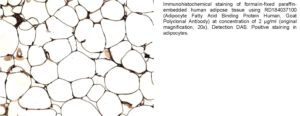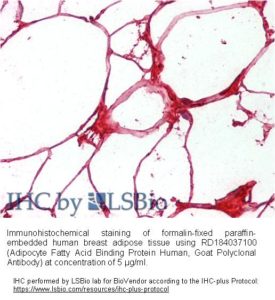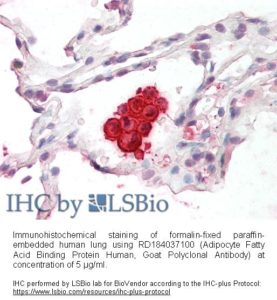Adipocyte Fatty Acid Binding Protein Human, Goat Polyclonal Antibody
Adipocyte fatty acid binding protein AFABP is a 15 kDa member of the intracellular fatty acid binding protein (FABP) family, which is known for the ability to bind fatty acids and related compounds (bile acids or retinoids) in an internal cavity. AFABP is expressed in a differentiation-dependent fashion in adipocytes and is a critical gene in the regulation of the biological function of these cells . In mice, targeted mutations in AFABP provide significant protection from hyperinsulinemia and insulin resistance in the context of both dietary and genetic obesity. Adipocytes obtained from AFABP-deficient mice also have reduced efficiency of lipolysis in vitro and in vivo, and these mice exhibited moderately improved systemic dyslipidemia. Recent studies also demonstrated AFABP expression in macrophages upon differentiation and activation. In these cells, AFABP modulates inflammatory responses and cholesterol ester accumulation, and total or macrophage-specific AFABP deficiency confers dramatic protection against atherosclerosis in the apoE-/- mice. These results indicate a central role for AFABP in the development of major components of the metabolic syndrome through its distinct actions in adipocytes and macrophages.
Type
Polyclonal Antibody
Applications
Western blotting, ELISA, Immunohistochemistry
Antibodies Applications



Source of Antigen
E. coli
Hosts
Goat
Preparation
The antibody was raised in goat by immunization with the recombinant Human FABP4.
Amino Acid Sequence
The immunization antigen (14.7 kDa) is a protein containing 131 AA of recombinant Human FABP4 and one extra AA, N-terminal methionin (highlighted).
Species Reactivity
Human. Not yet tested in other species.
Purification Method
Immunoaffinity chromatography on a column with immobilized recombinant Human FABP4.
Antibody Content
0.1 mg (determined by BCA method, BSA was used as a standard)
Formulation
The antibody is lyophilized in 0.05 M phosphate buffer, 0.1 M NaCl, pH 7.2. AZIDE FREE.
Reconstitution
Add 0.1 ml of deionized water and let the lyophilized pellet dissolve completely. Slight turbidity may occur after reconstitution, which does not affect activity of the antibody. In this case clarify the solution by centrifugation.
Shipping
At ambient temperature. Upon receipt, store the product at the temperature recommended below.
Storage/Expiration
The lyophilized antibody remains stable and fully active until the expiry date when stored at –20°C.Aliquot the product after reconstitution to avoid repeated freezing/thawing cycles and store frozen at –80°C. Reconstituted antibody can be stored at 4°C for a limited period of time; it does not show decline in activity after one week at 4°C.
Quality Control Test
SDS PAGE – to determine purity of the antibody
Note
This product is for research use only.
– Aragones G, Saavedra P, Heras M, Cabre A, Girona J, Masana L. Fatty acid-binding protein 4 impairs the insulin-dependent nitric oxide pathway in vascular endothelial cells. Cardiovasc Diabetol. 2012 Jun 18;11 (1):72

